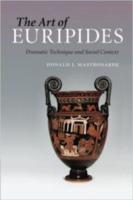
Cambridge UP (2015) 361pp £20.99 (ISBN 9781107646612)
This book was originally published in hardback in 2010, when it received the serious attention due to a leading Euripidean. But readers looking for interpretations of each of Euripides’ surviving plays will have to look elsewhere. Instead, M. surveys them under topics common to the whole oeuvre: modern scholarship and reception, problems of genre, dramatic structure, the chorus, gods, rhetoric and character, women, males and the limits of autonomy. This allows him to range beyond the strictly Euripidean; there are plenty of acute observations on Sophocles and Aeschylus, pointing out similarities that are often elided by the (now largely discredited) ‘literary history’ approach to tragedy—though M. rightly gives prominence to those characteristics of Greek drama that have always been labelled as especially Euripidean.
Most tragedy, he says, investigates ‘the order and disorder of the world humans inhabit by retelling and modifying traditional stories in a new form’. Tragedy does not have to be tragic. Plays ‘may present important areas of ambivalence…in their scrutiny of psychological, ethical, and social issues’; they are ‘multivocal…and no voices have absolute authority…or reliability’. There is no point in trying to squeeze them into a tight Aristotelian frame; they may have Wittgensteinian family resemblances to each other, but no more.
It is equally too constricting to consult narrowly Athenian democratic concerns in order to find the key to understanding drama’s impact, on either the contemporary audience or on us. M. also usefully observes that it can be perilous to pronounce confidently on the tragic genre when we have a mere handful of the 1,000 or so plays performed in the 5th century at Athenian dramatic festivals.
M. seems to want to link this instability of form to audience reaction. Everything in Euripides, he says, pushes spectators towards a state of aporia. It is certainly true that we are constantly being wrong-footed by Euripides in the course of a single play, sometimes in an uncompromisingly brutal way (think Dionysus and Cadmus in Bacchae, or the end of Medea), but M. is surely wrong to identify this as our principal reaction. Quite apart from the impossibility of multiple rationalizations (there’s simply no time), he gives insufficient weight to the emotive power generated by a dramatic performance. Gorgias (Helen) knew all about being drawn into the action and identifying with people on the stage. This reviewer looked in vain for recognition of the sheer emotional force of a Medea or a Hecuba. Here, as elsewhere, one suspects M. of over-intellectualizing. It is odd to sense the ghost of Verrall lurking just offstage.
That said, there is plenty in this book to interest the non-expert, classically-minded reader (no Greek is quoted). M. is good, for example, on the often awkward invasion of rhetoric into emotional speeches where we post-Romantics would expect unadorned, simple passion. Ways of expressing oneself effectively were big news in 5th century Athens, and many in the audience would have recognized and enjoyed their deployment. And there is a perceptive discussion on the chorus’ simultaneous closeness to and distance from the audience.
Ardent Euripideans will find much to enjoy in this book, and teachers studying a particular play will do well to let themselves be led on by references in the index. But though it is clearly the fruit of a career’s thinking about and teaching Euripides, this reviewer was left with a niggling feeling that much of it travels through terrain already fought over. Somehow one expected more from someone of M.’s reputation and eminence.
Anthony Verity
